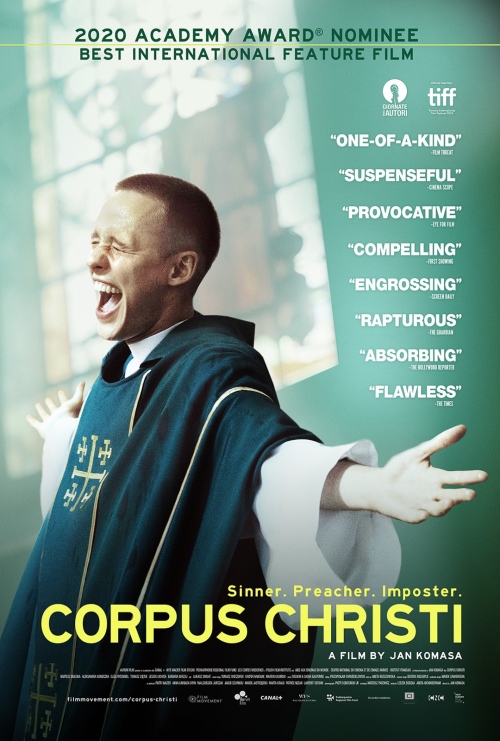This week’s Academy Award nominations didn’t include many surprises anywhere – at least, not if you assume the worst of the Academy – and many categories already seem like their winners are locks, including Parasite as the Best International Feature Film, which would make it the first South Korean winner of that award (it’s already the first nominee). Three of the other nominees were widely expected – Pedro Almodóvar’s Pain and Glory, which also landed a Best Actor nod for Antonio Banderas; the acclaimed Honeyland, which doubled up with a nod for Best Documentary Feature; and the French entry, Les Misérables, which isn’t based on the novel, and won the Prix du Jury at Cannes last May.
There was one surprise in the category, however – the Polish entry, Corpus Christi, which was at least less widely-known or reviewed than some of the other submissions, but is an absolute stunner of a story, one that manages to pack substantial themes into a modest plot. Powered by an incredible lead performance by Bartosz Bielenia as Daniel, a paroled convict who wants to enter the priesthood but is told by the prison chaplain that no seminary will accept a convicted felon. When he arrives at his assigned job at a sawmill in a small town on the other side of Poland, a chance encounter with Marta, a girl he seems to want to impress, leads him to pretend to be the new priest temporarily assigned to the village while their main priest is away.
It turns out that his timing is fortuitous for the town, as they’re still reeling from a tragedy that took the lives of seven people and that has created a rift between the families of the victims, with recriminations mostly headed towards one widow whose husband is blamed for the accident and who has been ostracized and targeted as a result. Daniel, meanwhile, fully embraces his role as priest, at first borrowing some ideas from the prison chaplain’s sermons but quickly finding his own voice, expressing his own faith with elements of Jesus’s secular philosophy, a little bit of primal scream therapy, and a powerful ability to connect with people that he didn’t even know he had.

There are points in Mateusz Pacewicz’s script where it feels like we might be heading down familiar territory – maybe this is the time when Daniel gets caught, or maybe the town experiences a spiritual awakening thanks to Daniel and everyone is redeemed. Nothing is that simple, not in the plot as a whole, and not in the subplots like that of the accident or the role of the power-hungry mayor (who owns the sawmill). Daniel’s character is rich and complex, and his transformations reflect a more basic truth about how environments affect people’s ability to change or simply to let their better selves show through. The townsfolk themselves are also well-drawn, and at times inscrutable, closing ranks even when they know they’re wrong, happy to mouth the words in church but not to live it even when Daniel reminds them of the messages of Christ’s love for mankind or of the need to forgive. The script delivers so many powerful scenes, but the one where the victims’ family members are confronted with the hate mail they sent the widow particularly stands out for its impact and how Daniel and Eliza stand in the face of such animosity.
Bielenia’s performance drives this film, and had anyone actually seen this in 2019 – if the film had been in English – he would have been more than deserving of nominations and awards for what he does for Daniel. He’s capable of grand emotions, including the rage he shows in some of the scenes in prison, but his performance is at its most powerful when he slows everything down, even when that’s an indicator that Daniel is in a bit over his head and trying to draw upon his faith to choose the right words or actions. He’s a more effective priest for his inexperience, as his sermons are more authentic, but those scenes had the potential to become trite if overplayed by the actor; Bielenia shows a restraint throughout the film, even when Daniel is confronted with threats to his secret and to his person, that makes the performance more credible and more compelling.
Director Jan Komasa particularly nails the landing of Corpus Christi, which ends in mostly unexpected fashion, including multiple shots of Daniel as he exits the church for the last time or in the final shot of the film. It’s ultimately an uplifting story, but rich with the complexity of actual people who are trying to reconcile their unspeakable grief with their faith, and who default to their baser instincts in a failed attempt to cope with their rage. Parasite is going to win the Oscar, but if the nomination gets more people to watch Corpus Christi when it’s released in the U.S. next month, so much the better. It deserves a wider audience than it might otherwise have gotten.
How did you see it?